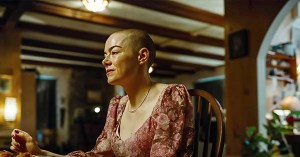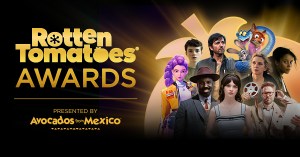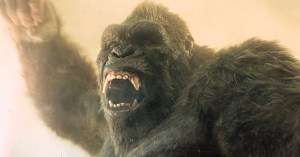An Oral History of Split with M. Night Shyamalan and James McAvoy
Find out how The Beast got its start in the original script for Unbreakable, and how James McAvoy got his start on Split at a Comic-Con party.
Split was a game-changer for director M. Night Shyamalan, who hadn’t had a Certified Fresh film since 2002’s Signs. It cemented his “comeback,” following creepy – and Fresh – The Visit, and it opened up a world of storytelling possibilities with its confirmation that there was a Shyamalan superhero universe (we still remember the gasps as Shyamalan revealed Bruce Willis’s David Dunn as a final twist). The worlds of Split and Unbreakable were always intertwined, according to the director, who reveals in Rotten Tomatoes’ oral history of the 2016 thriller that the character of Kevin Wendell Crumb (a.k.a. The Horde) was originally supposed to appear in the earlier film. Split was also a game-changer for James McAvoy, who dug into what was arguably his meatiest role in Crumb, who suffers from Dissociative Identity Disorder, a condition that manifests in the film as 23 distinct personalities (and 24 if you count the Beast). Here, Shyamalan recalls meeting McAvoy at a Comic-Con party and knowing instantly that he was the man to play The Horde, while McAvoy talks us through the appeal – and ultimately, the challenge – of bringing so many characters to life.
What follows is a history of Split (2017), and reflection upon it, drawn from sit-down interviews with M. Night Shyamalan and James McAvoy.
ALSO WATCH: An Oral History of Unbreakable | An Oral History of Glass
“Essentially, Split and Unbreakable were the same movie.”
M. Night Shyamalan: I wrote an outline for Unbreakable that included Kevin Wendell Crumb. Essentially, the movie Split and Unbreakable were the same movie. [In the original script, Kevin] abducts three girls while David survives this crash and is told, “Hey, I think you’re a superhero.” We keep cutting to this storyline with the girls and they’re being held here… the multiple personalities. And they say, “The Beast is coming, The Beast is coming.” Meanwhile, [David’s] like, “No, I’m not a superhero. No, I’m not a superhero.” Then he goes, “Maybe I am.” And he goes to the train station and bumps into The Horde and gets the vision of the girls and The Beast, and then The Beast and him fight in that big moment at the end of the original Unbreakable. These are comic-book movies, but it’s really about what it’s like to be a regular person and somebody that has these powers, and to do that I had to take Kevin out of it ’cause all you wanted to do was be with Kevin. As soon as you start that ticking clock with the girls, you can’t stay away from it. You have to go back quickly. It started putting this enormous pressure on the character that I wanted to build. So, I took him out and made a movie just about Elijah and David.

(Photo by @ Universal Pictures)
“What would happen if we never told anybody we were making a sequel and we didn’t sell it that way?”
Shyamalan: I guess what happened [to make him finally make Split, with the character of Crumb] is that the type of movies that I was making changed in recent years. I wanted to make contained, smaller movies that I could control – I can make them as weird and really signature and take a ton of risks, and when someone says that’ll never work, perfect! Put it in. I made The Visit that way. Then I said, You know what? The next movie… I could make Split, I could make that second movie. And what would happen if we never told anybody we were making a sequel and we didn’t sell it that way and we just made it and put it out and only in the last moment told them, “Hey, guess what? We’re making a trilogy.”
“I was staring at James as he’s talking…and I’m like, this is the guy.”
Shyamalan: [James McAvoy and I were] at an event [at Comic-Con] and he walked by me and I was like, “Oh, hey man.” And I just grabbed his arm and he goes, “Hey.” We’d never met before. And I said, “I’m a fan of yours.” And he said, “I’m a fan of yours.” He had come back from X-Men and so his hair was growing back from being shaved; it was kind of like an inch long, maybe three quarters of an inch long, and I was staring at him as he’s talking. I had written Split, and the first time I checked he was unavailable, but I was staring and I’m like this is the guy. This is what the guy should look like. We shouldn’t do any wigs. No make-up. Just let him do this and change personalities.

(Photo by Linda Kallerus/©Universal Pictures/courtesy Everett Collection)
“I turned the first page and like, oh wow.”
James McAvoy: One of the questions I usually ask is, “What character is it you’re looking for me to play?” Because I don’t like reading a script when I don’t know which character it is – because there may be two or three that you’d be right for – you get to attached to the wrong one or whatever and then they’re like, “Oh no, it’s for the other guy.” To that question he said, “Just read it. You’ll see. It’s a lot. Just go with it.” And I turned the first page and like, oh wow. Second page, oh something different. And then I start to understand the complexities, or the fact that I’m playing a character with Dissociative Identity Disorder and just how many characters I’ll be playing, and I just saw it as a really interesting opportunity to explore DID.
“You know when an actor’s in the pocket and when they’re doing something extraordinary.”
Shyamalan: The crew would start clapping on Split whenever [McAvoy] finished [a scene] because we knew we were watching something extraordinary. The other actors, as well. They would shake their heads. Because you know when an actor’s in the pocket and when they’re doing something extraordinary that’s happening in front of you like you can’t believe it. He was doing that with these characters, and multiple times I went to him and I go, “I don’t understand. There’s maybe five people in the world that could even try to do what you’re doing right now and you’re doing it. And you’re doing it effortlessly.” And I’m like, “You need to be doing the best roles, the hardest roles in the world, because what you’re doing is astonishing.”

(Photo by © Universal Pictures)
“I was 37; pretending to be nine years old is potentially unwatchable.”
McAvoy: I enjoyed playing Patricia, because there’s something slightly repressed and kinky about her. I enjoyed playing Hedwig because he was so free and yet so vulnerable at the same time; that’s a nice contradiction that allows for a lot of play. As an actor, I mean. I think the hardest [character] to find was Hedwig. I was 37 at the time – I think I was – and pretending to be nine years old is potentially unwatchable. And even if it is watchable, it might not be watchable for more than half a minute before you go like, “Ah, I don’t know if I want to watch too much more of this.” So that was tricky. And I wasn’t really getting a handle on it. Then Night came along and said, “Why don’t you try it with a lisp?” And I was quite resistant to that. I was like, “I don’t know man – kid’s got enough going against him at the moment, and all that.” He’s already so idiosyncratically different from everybody else that it felt like too much. But as soon as we did it, it worked.






